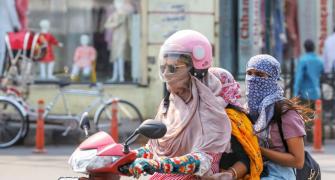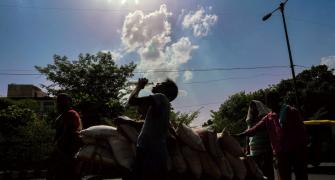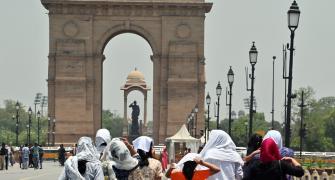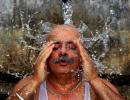Large parts of north India, including Haryana and Delhi, reeled from severe heatwave conditions with the maximum temperature touching 47.4 degrees Celsius in Najafgarh in the national capital -- the highest in the country on Monday.

Temperatures remained above 45 degrees Celsius in large parts of Rajasthan, Haryana, Delhi, Chandigarh and Uttar Pradesh, affecting daily life as many chose to remain indoors in the afternoon.
The crippling heat strained low-income households, which often have poor access to water and cooling, and tested the endurance of outdoor workers toiling in the searing sun, forcing them to take frequent breaks.
"Today (Monday), heatwave to severe heatwave conditions were observed in many places over Haryana and Delhi. Heatwave conditions were observed in some pockets over Rajasthan and Uttar Pradesh and isolated pockets of Punjab, Gujarat and Madhya Pradesh," the India Meteorological Department (IMD) said.
Temperatures in several parts of Delhi again breached the 47 degrees Celsius mark, with the weather office issuing a red alert for the next five days due to heatwave to severe heatwave conditions in the national capital.
Several state governments have asked schools to declare holidays for a few days due but have provided the option of online classes.
The Delhi government directed the schools that have not closed for summer vacations to do so with immediate effect.
In a circular, the city government's Directorate of Education said all schools were directed to observe summer vacation from May 11 to June 30 for this academic year.
The Punjab government announced summer holidays in all government, aided and private schools from May 21 to June 30 amid severe heatwave conditions.
The Directorate of School Education, Jammu, ordered a change in the school timing in the division's summer zones due to the extreme heat.
The new timing -- 8 am to noon -- came into effect from Monday in all government and private (recognised) schools up to the higher secondary level.
The Directorate of Higher Education in Himachal Pradesh also ordered a change in the school timing for places in the lower hills after a heatwave alert was issued for several districts.
While large parts of northern India experienced scorching heat, southern states such as Kerala and Tamil Nadu were drenched by rain, an indication of the southwest monsoon's onset later this month.
In Delhi, the searing heat also pushed the city's peak power demand to its highest for May. Realtime data from the State Load Dispatch Centre, Delhi, showed the peak power demand at 7,572 MW at 3:33 pm. This was the highest-ever peak power demand for Delhi in May. It was also higher than the peak power demand recorded last year -- 7,438 MW -- on August 22.
Ayanagar in the national capital recorded a maximum temperature of 45.7 degrees Celsius, four notches above normal. The weather station had clocked 47.4 degrees Celsius on May 28, 1988, the highest between 1967 and 2024, the period for which data is available.
Safdarjung, the base station for Delhi, recorded its highest maximum temperature of 47.2 degrees Celsius on May 29, 1944 -- the highest for the weather station, which has maintained records since 1931.
The Palam station, near the international airport, recorded a maximum temperature of 48.4 degrees Celsius on May 26, 1998. Palam has records dating back to 1956.
In Rajasthan, the mercury soared to 46.3 degrees Celsius in Ganganagar, 46.1 degrees in Barmer, 45.8 degrees in Kota, 45.5 degrees in Churu and 44.8 degrees in Bikaner.
In Madhya Pradesh, Ratlam and Nowgong recorded a maximum temperature of 45.5 degrees Celsius, followed by Datia at 45.2 degrees, Khajuraho at 44.8 degrees, and Gwalior at 44.7 degrees.
In Haryana, Sirsa recorded a maximum temperature of 47.2 degrees Celsius, followed by Nuh at 46.8 degrees, Faridabad at 46.2 degrees, Jhajjar at 45.9 degrees, and Bhiwani and Narnaul at 45.7 degrees each.
Chandigarh, the joint capital of Punjab and Haryana, recorded a high of 43.2 degrees Celsius.
In Punjab, Amritsar recorded a maximum temperature of 44.5 degrees Celsius while Ludhiana recorded 43.6 degrees.
Experts say outdoor workers, the elderly and children are at higher risk of heat exhaustion and heatstroke.
According to the World Health Organisation, more than 1,66,000 (1.66 lakh) people died as a result of heat waves between 1998 and 2017.
People are less productive during hot weather and children struggle to learn.
April also logged record-smashing maximum temperatures in east, northeast, and peninsular India, prompting health warnings from government agencies and a few states to suspend in-person classes in schools.
Several places recorded their highest-ever April day temperatures, and at least five people died in the country due to suspected heatstroke during this period.
A group of leading climate scientists last week said similar heat waves could occur once every 30 years, and these have already become about 45 times more likely due to climate change.
The IMD had earlier warned of extreme heat in India during the April-June period, coinciding with the seven-phase Lok Sabha elections that end on June 1.
The threshold for a heatwave is met when the maximum temperature of a weather station reaches at least 40 degrees Celsius in the plains, 37 degrees in the coastal areas, and 30 degrees in the hilly regions, and the departure from normal is at least 4.5 notches.
A severe heatwave is declared if the departure from normal exceeds 6.4 notches.









